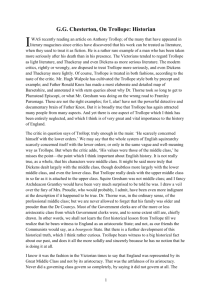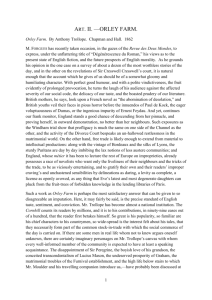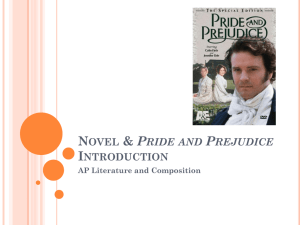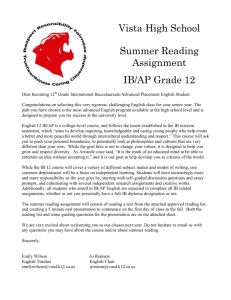5. Foreign Spaces - University of Warwick
advertisement
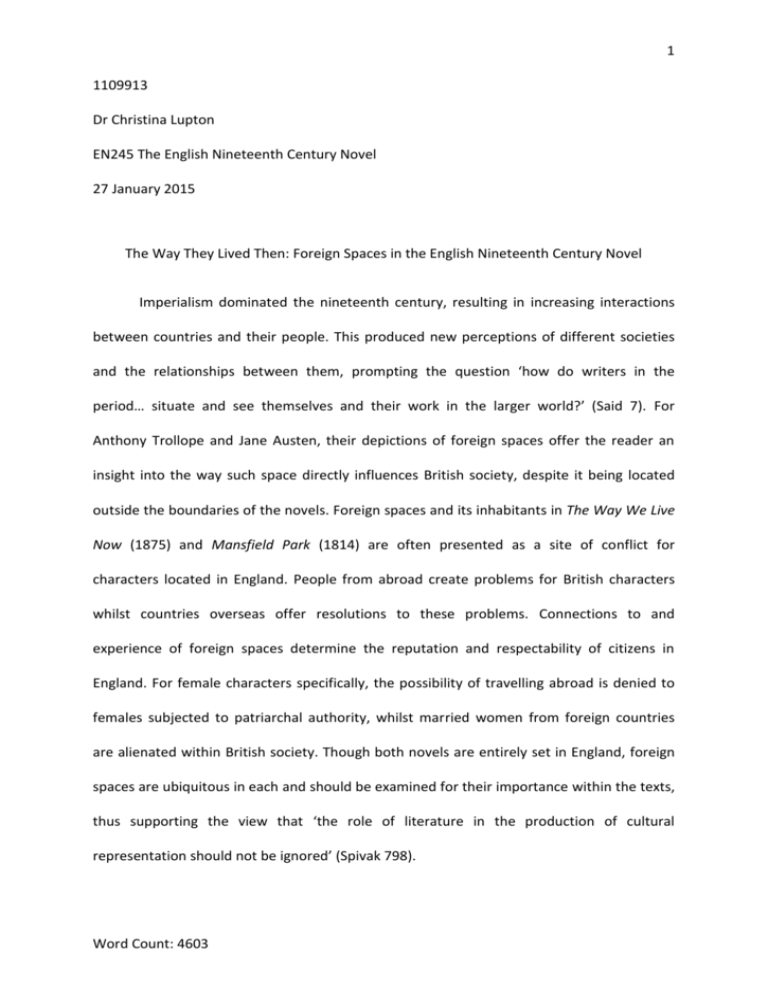
1 1109913 Dr Christina Lupton EN245 The English Nineteenth Century Novel 27 January 2015 The Way They Lived Then: Foreign Spaces in the English Nineteenth Century Novel Imperialism dominated the nineteenth century, resulting in increasing interactions between countries and their people. This produced new perceptions of different societies and the relationships between them, prompting the question ‘how do writers in the period… situate and see themselves and their work in the larger world?’ (Said 7). For Anthony Trollope and Jane Austen, their depictions of foreign spaces offer the reader an insight into the way such space directly influences British society, despite it being located outside the boundaries of the novels. Foreign spaces and its inhabitants in The Way We Live Now (1875) and Mansfield Park (1814) are often presented as a site of conflict for characters located in England. People from abroad create problems for British characters whilst countries overseas offer resolutions to these problems. Connections to and experience of foreign spaces determine the reputation and respectability of citizens in England. For female characters specifically, the possibility of travelling abroad is denied to females subjected to patriarchal authority, whilst married women from foreign countries are alienated within British society. Though both novels are entirely set in England, foreign spaces are ubiquitous in each and should be examined for their importance within the texts, thus supporting the view that ‘the role of literature in the production of cultural representation should not be ignored’ (Spivak 798). Word Count: 4603 2 1109913 Dr Christina Lupton EN245 The English Nineteenth Century Novel 27 January 2015 Locations outside of England produce problems for characters within Britain. In Mansfield Park, Sir Thomas Bertram finds himself facing ‘some recent losses on his West Indian estate’ (Austen 23). This is an unwelcome complication because of the dependency the Bertram family have on the income produced by the estate. It was a common feature of the British Empire for its imperialists to possess land overseas in the form of plantations. In this case, the Bertrams own a property in Antigua, known for being a sugar colony. Austen does not provide an explanation of the consequences of an unproductive sugar plantation because ‘the importance they posed for British well-being was widely recognized and broadly accepted’ (Wright 24). This does not mean that Sir Thomas’ trip to Antigua lacks importance, despite it being ‘referred to only in passing’ (Said 106). It is, in fact, ‘absolutely crucial to the action’ (Said 106) in the way it frames the narrative of the novel. Structurally, Austen introduces the Antiguan estate relatively early in Mansfield Park. By doing so, she immediately widens the geography of the novel to incorporate foreign spaces, which alerts the reader to the position of the Bertrams’ family home within a global setting. Even though the novel mainly focuses on events that occur within Mansfield Park, these activities are only able to take place because of the income made from the plantation. The problem with the estate must be resolved otherwise ‘Sir Thomas’s means will be rather straitened’ (Austen 26), and so Sir Thomas must leave the country, and the novel, for an extended period of time. His absence from Mansfield Park is a reversal of his role as an absentee Word Count: 4603 3 1109913 Dr Christina Lupton EN245 The English Nineteenth Century Novel 27 January 2015 landlord of the Antiguan plantation, drawing parallels between the patriarchal and imperialist authority of the two estates. In The Way We Live Now, it is the people who come from abroad that create problems for characters within Britain. Mrs Hurtle, an American widow, arrives in London ‘with the express purpose of enforcing the fulfilment of an engagement which Montague had often acknowledged’ (Trollope 543). This determined goal is unsuccessful, but her attempts to succeed are an inconvenience for Paul Montague and his burgeoning relationship with Henrietta Carbury, a young British woman. Their first meeting takes place before the events of the novel in America, and though Paul has since returned to London and decided to end the engagement, this does not prevent Mrs Hurtle from following him across the Atlantic, highlighting the ease of transportation within the increasingly globalised world of the nineteenth century. In a novel pervaded by dishonesty and greed, Paul’s response to Mrs Hurtle’s arrival reveals how intensely he wishes for his problem to be resolved: ‘He would have given much of his golden prospects in the American railway to have had Mrs Hurtle reconveyed suddenly to San Francisco’ (Trollope 212). It is not merely her presence which aggravates Paul, but her enigmatic past that follows her also. In his desperate attempts to find a valid reason for why their engagement must come to an end, Paul discovers that ‘in San Francisco Mrs Hurtle was regarded as a mystery’ (Trollope 198). He receives this information from another American, Hamilton K. Fisker, suggesting that Word Count: 4603 4 1109913 Dr Christina Lupton EN245 The English Nineteenth Century Novel 27 January 2015 foreigners are not always problematic for the British. But whilst ‘these compelling American women, with their shadowed American pasts, bring maturity and sexual experience into the courtship plot’ (Claybaugh 222), Paul is determined to put an end to his relationship with her. To do so, it is suggested that Paul should travel to America to find out the truth behind Mrs Hurtle’s past (Trollope 229), showing that, whilst America has produced a problem for Paul, it can also offer a resolution. This can be likened to Sir Thomas’ relationship with his plantation in Antigua. Mrs Hurtle is not the only foreigner to invade the British Isles and cause disorder for its citizens. The Melmottes arrive in London two years before the novel begins, but the family are more gradual in creating problems within the society. In the opening chapters of The Way We Live Now, it is the British who are described as being difficult as Fisker says ‘you regular John Bull Englishmen are so full of scruple that you lose much life as should serve to make an additional fortune’ (Trollope 67). The author provides an early perspective of British society from an American point of view, identifying the contrast between the two nations and their values, as well as the ‘factitious binary between the Self and the Other’ (Munjal 2) which dominated the century of imperialism. The Melmottes’ presence in London takes a complicated turn for the worse when revelations of Augustus Melmotte’s financial deceptions come to light: ‘it was declared that every shilling which he had brought to England with him had consisted of plunder stolen’ (Trollope 410). This news creates severe Word Count: 4603 5 1109913 Dr Christina Lupton EN245 The English Nineteenth Century Novel 27 January 2015 concern amongst London society, as Melmotte has been at the centre of all business dealings for the entire course of the novel. That he has come from abroad with stolen money and used it within the British system shows how ‘England is the one society vulnerable, stupid and corrupt enough to admit Melmotte’ (Kincaid 166). This realisation is unsettling for British citizens, who pride themselves on being the dominant power in the nineteenth century, as well as for the London society that makes up the largest city in the world at the time. One of the defining acts of deception that Melmotte commits is forgery, and combined with Trollope’s description of the ‘plunder’ Melmotte had stolen, the author evokes an image of pirates and piracy, making a connection to the colonial world the novel is set in. The ultimate problem for the British in regards to the Melmottes is ‘how would it tell in all the foreign newspapers’ (Trollope 445) of the patriarch’s unscrupulous behaviour in London? In this way, the complications that arise from foreign people arriving in London is cyclical, as there is concern for how the British will be portrayed overseas for interacting with particular people from those foreign places. Whilst foreigners within Britain can create complications, the potential for the British to travel overseas is often presented as a resolution to problems at home. For both Trollope and Austen, sending young men abroad offers them the chance to mature by taking on greater responsibilities and escape from the vices they have succumbed to at home. Throughout The Way We Live Now, Sir Felix Carbury is depicted as an immoral and Word Count: 4603 6 1109913 Dr Christina Lupton EN245 The English Nineteenth Century Novel 27 January 2015 debauched rake, unable to end his gambling and drinking habits despite facing destitution for himself and his family. His mother, Lady Carbury, is regularly prompted by older male advisors to send her son abroad: ‘A career might possibly be opened up for him in India’ (Trollope 52), ‘we will then try to get him to go abroad’ (Trollope 399). These suggestions fall on deaf ears as Lady Carbury remains adamant that Felix will find his success whilst at home. However, by the end of the novel, the only resolution that can be found for Felix and the trouble he has caused, is to send him to Germany in the company of a Reverend. This conforms to Trollope’s narrative trope, as he ‘allows his romantic brutes a good deal of lay before they are ultimately banished from the narrative realm, often in a punishing manner’ (Lutz 24). Felix’s punishment is the loss of independence he abused whilst in London, as well as submitting to a patriarchal authority from the Reverend that has not been present since his father had died. By sending Felix abroad, he experiences circumstances that counteract his lifestyle in London that have the potential to improve his maturity from a self-indulgent youth. Felix’s exploits can be likened to Tom Bertram’s in Mansfield Park, as he is also taken abroad ‘in the hope of detaching him from some bad connexions at home’ (Austen 31). Tom accompanies his father to the Antiguan estate, again demonstrating how sending a young man abroad to improve requires some patriarchal assistance. Travelling abroad offers the opportunity of redevelopment, education and repentance for the corrupt and immoral lifestyles of the British male youth. Word Count: 4603 7 1109913 Dr Christina Lupton EN245 The English Nineteenth Century Novel 27 January 2015 As the likes of Felix and Tom travel abroad to redefine themselves and atone for their misdemeanours, any connection to foreign lands can directly determine the reputation and respectability of citizens in England. ‘National integrity is always suspicious of foreignness’ (Park and Sunder 89) and this is most evident in The Way We Live Now, but interactions with places and people overseas can significantly improve the status of a character too. Augustus Melmotte experiences both responses to his foreign identity, as his presence in London creates romanticised stories of his past and origins. One of the first rumours of Melmotte’s past activities highlights his worldly influence: ‘it was said that he made a railway across Russia, that he provisioned the Southern army in the American civil war, that he supplied Austria with arms, and had at one time bought up all the iron in England’ (Trollope 27). The extensive list of achievements Melmotte has undertaken across the globe may seem impressive and implies why the British characters are eager to conduct business with him, but the words ‘it was said’ alerts the reader to the possibility of falsehood in the description. Trollope often uses phrases that suggest rumour and misrepresentation when describing the life of Melmotte before he moved to London, yet Melmotte’s ‘hollowness is ignored because society wants to believe in him’ (Tracy 165) and his potential to help British society to prosper. Yet, when the truth about Melmotte and his family is eventually revealed, their respect disappears also: ‘People said that Mr Melmotte had a reputation throughout Europe as a gigantic swindler – as one who in the dishonest and successful pursuit of wealth had stopped at nothing’ (Trollope 57). This revelation is yet Word Count: 4603 8 1109913 Dr Christina Lupton EN245 The English Nineteenth Century Novel 27 January 2015 another rumour, which has come from abroad to reach British shores, and ultimately undermines Melmotte’s reputation as a respected financial and political figure of London society. His foreignness and dealings abroad were originally a source of reverence for the character, but his time in those places also becomes his downfall in London society. Lady Carbury’s own past foreign experiences influences her reputation and actions in the present setting of the novel. Having married a British soldier in India who ‘occasionally spoilt his darling and occasionally ill-used her’ (Trollope 11), Lady Carbury’s social standing suffered a significant blow when she left her husband. On returning to England having reunited with her spouse, ‘the scandal of her great misfortune had followed her’ (Trollope 13). For a proud and independent widow as portrayed in The Way We Live Now, Lady Carbury is still haunted by the humiliation she suffered whilst in India. She rather timidly says to her future husband, Mr Broune, at the end of the novel, ‘they say bad things of me in India’ (Trollope 755), contributing to the cyclical form of the text which evokes the endless output of rumours about members of society. To cope with her damaged reputation, Lady Carbury seeks ways of re-establishing herself and her children within London, and the main way she does this is by insisting that her son Felix marries Marie Melmotte, the wealthy heiress. For Lady Carbury, this matchmaking scheme will result in Felix being ‘the husband of the richest bride in Europe’ (Trollope 50), suggesting that to achieve a good reputation, the Carburys must be a dominant force in foreign lands. This is Word Count: 4603 9 1109913 Dr Christina Lupton EN245 The English Nineteenth Century Novel 27 January 2015 an example of Trollope concentrating on ‘the minutiae of social behaviour to unveil operations of imperial power at the domestic level’ (Munjal 3). As Lady Carbury believes that her family’s social advancement will come from being respected overseas, the British Empire also relies on the occupation of land abroad in order to be the dominant power. Lady Carbury explicitly refuses to allow foreign lands to define her reputation in a negative way as she questions ‘must she give up all and retire to the dreariness of some French town because it was no longer possible that she should live in London?’ (Trollope 550). The free indirect speech used by Trollope in this question is another way of demonstrating Lady Carbury’s authoritative measures to ensure her reputation is rebuilt on her own terms. As a British character directly influenced by her reputation abroad, she uses foreign spaces to counteract her tarnished respectability. In Mansfield Park, Sir Thomas suffers a similar reaction from his family when he returns home from Antigua as Lady Carbury does from society when she arrives back from India. For when the inhabitants of Mansfield Park are informed of his arrival, ‘to the greater number it was a moment of absolute horror’ (Austen 176). Sir Thomas’ presence in the home signifies a patriarchal authority which denies the younger Bertrams the opportunity to act, which is the main cause of this disrespectful response to Sir Thomas’ return. But his lengthy time abroad tarnishes his reputation in a way that is directly related to his stay overseas. His features are quite literally tarnished as Austen describes: ‘he had grown Word Count: 4603 10 1109913 Dr Christina Lupton EN245 The English Nineteenth Century Novel 27 January 2015 thinner, and had the burnt, fagged, worn look of fatigue and a hot climate’ (179). The effects of spending such a long period of time in a foreign country has physically altered his looks, not just his reputation within the household. Moreover, respect for Sir Thomas is at its lowest when Mary Crawford compares Sir Thomas to ‘the old heathen heroes, who, after performing great exploits in a foreign land, offered sacrifices to the gods on their safe return’ (Austen 110). These heathens Mary speaks of would be found in colonies of the British Empire, and by comparing Sir Thomas to them, his entire reputation as a respectable English gentleman is destroyed. These responses to Sir Thomas’ return home shows ‘the problematic nature of the process of incorporating Empire into ideas of Englishness’ (Park and Sunder 76). Sir Thomas risks his reputation in his home estate by travelling to another overseas. However, Sir Thomas eventually assimilates back into his home when he finds his experiences abroad are a source of entertainment for his family. He becomes the ‘life of the party’ (Austen 179), and achieves ‘the best right to be the talker’ (Austen 179), thus reinstating his respect as head of the household. This form of respect related to the knowledge of foreign spaces can also be seen with William Price, Fanny’s brother, in Mansfield Park. A midshipman in the Navy, the character has had numerous experiences abroad, which justifies his reputation in the Bertram estate. With the approval of Edmund who calls William’s career ‘a noble profession’ (Austen 61), William is given the right ‘to be the talker’ (Austen 238) by Sir Thomas in front Word Count: 4603 11 1109913 Dr Christina Lupton EN245 The English Nineteenth Century Novel 27 January 2015 of his family and friends, fulfilling a role similar to the one Sir Thomas occupied when he returned from Antigua. By relaying his experiences overseas to his audience, William demonstrates his ‘good principles, professional knowledge, energy, courage, and cheerfulness’ (Austen 238), thus cementing his deserved reverence. It can be seen that Austen ‘operates within an accepted paradigm of patriotism, nationalism and respect for the navy’s keen sense of duty’ (Kuwahara 110), with two of her own brothers having been a part of the British navy. William’s admirable qualities extends to influence other young male characters within the novel too. Henry Crawford, a largely promiscuous reprobate, finds himself inspired by William’s stories of working in the navy abroad, as he ‘longed to have been at sea, and seen and done and suffered as much’ (Austen 239) as Fanny’s brother. The word ‘suffered’ suggests that it is the sacrifice and selfless nature of the profession which appeals to Henry the most. It is a surprising declaration from Henry, who has not suffered the hardships that William has had to reach his respected position in society, and yet Henry ‘wished he had been a William Price’ (Austen 239). His willingness to become another man entirely shows how profoundly William’s revered reputation and his foreign experiences that cement it effect Henry’s own perception of his life. In comparing himself to William, Henry highlights his own isolated existence within England as opposed to William’s welltravelled lifestyle. Word Count: 4603 12 1109913 Dr Christina Lupton EN245 The English Nineteenth Century Novel 27 January 2015 Isolation from foreign spaces is specifically experienced by female characters in The Way We Live Now and Mansfield Park. This is largely due to the ‘condition of womanhood under the weight of patriarchal relations’ (Wright 27) as females who are subjected to paternal authority in the novels are restricted from going abroad. For Trollope, this often leads to the prevention of marriage, because ‘for many of Trollope’s heroines, life offers only the challenge of making a brilliant marriage’ (Kincaid 29). In The Way We Live Now, the Longestaffe sisters are denied by their father the opportunity to go on an overseas tour in favour of staying in the countryside for the season. For Georgiana, if she cannot stay in London, she would rather be overseas, as this will increase her prospects of finding a marriage partner (Trollope 97). Whilst travelling abroad offers social advancement for young men, as can be seen by William Price, and often requires some form of paternal accompaniment, as seen by Sir Felix Carbury and Tom Bertram, Georgiana sees foreign spaces as an opportunity for young women to leave the authority of their fathers and discover a new relationship with a man: ‘it was there that Clara Beauchamp met young Lord Liffey’ (Trollope 97). It can be construed that the father’s resolve to keep his daughters in England is a means for maintaining his authority over them. This parallels the nature of the British Empire, as the British sought to keep control over its possessions by subjugating the colonial inhabitants. The relationship between the submission of females and the colonised continues, as the Longestaffe girls ‘had shown by every means in their power that they would mutiny against any intention on their father’s part to keep them’ (Trollope 98). The Word Count: 4603 13 1109913 Dr Christina Lupton EN245 The English Nineteenth Century Novel 27 January 2015 use of the word ‘mutiny’ recalls the 1857 Indian Mutiny that remained firmly entrenched within the British consciousness for the latter half of the nineteenth century, thus creating a parallel between British women and the colonised people. Prohibiting foreign spaces for female characters under patriarchal control encourages rebellion against the prohibition. Marie Melmotte provides a prime example of this behaviour, as she plans to elope with Felix to New York in The Way We Live Now. Again, a female character seeks to travel abroad in order to find marital success and removal from a father’s authority. Though a foreigner herself, being a citizen of England and living with her father, Marie is subjected to the same kind of paternal authority as the Longestaffe sisters. Her control of the escapade is evident as Felix remarks that ‘the young lady had it all at her fingers’ ends’ (Trollope 312). Marie’s planning is meticulous because the success of the elopement is so desirable for her. In the descriptions of her childhood, she has always transitioned from one country to the next with her father, never alone. This trip to New York would be her first step towards finding independence away from the violent and aggressive patriarchal authority she has been used to (Trollope 555). However, Marie is unsuccessful in her attempts to elope, and the next opportunity she has of leaving the country is only after her father commits suicide. In light of this, Marie is able to make a wholly independent decision over whether or not she should leave Britain, resulting in the assertion that ‘in the United States, a married woman has greater power over her own money than in England’ Word Count: 4603 14 1109913 Dr Christina Lupton EN245 The English Nineteenth Century Novel 27 January 2015 (Trollope 746). As much as Marie is determined throughout the novel to disobey her father, it is in this realisation that Marie becomes so much like her father, as she seeks the best places abroad to control her money. Her decision to leave for America is not entirely her best option as ‘Trollope often traces with great insight the common paths women follow through courtship, where their attempt to preserve their independent being leads them finally to feeling isolated, perverse, and consequently guilty’ (Kincaid 29). This is true of Marie, who is told that America may not offer her the escape she needs from her family’s rise and fall in London society, as Fisker points out ‘after the sort of society you’ve been used to here, I don’t know how you’ll get on among us Americans’ (Trollope 701). Though Marie eventually enters foreign space, it is at the expense of her father’s death and at the risk of further isolation. Isolation continues to be a significant theme related to foreignness and female characters in The Way We Live Now. For both Mrs Hurtle and Madame Melmotte, who are married foreign women within British society, their mysterious pasts alienate themselves in the present. ‘With married women Trollope’s treatment is often even harsher’ (Kincaid 30) and this can be seen in the way these two women are treated by London’s society. For Mrs Hurtle, Trollope rarely situates the character outside of Mrs Pipkin’s Islington lodgings, so her interactions with the wider society are extremely limited. Trollope gives an early warning to the reader that ‘the manners of her country are not as the manners of this Word Count: 4603 15 1109913 Dr Christina Lupton EN245 The English Nineteenth Century Novel 27 January 2015 country’ (Trollope 354). In doing so, the reader themselves becomes immediately wary of what Mrs Hurtle might say or do, suggesting that the character is vastly different from the people of Britain and should therefore be treated with caution. Mrs Hurtle’s own selfperception contributes to the overall alienated feeling Trollope creates around the character, as she says ‘she knew enough of herself, and enough of Englishwomen, to be sure that when her past life should be known, as it would be known, she would be avoided in England’ (Trollope 363). Unlike Marie who is determined to leave Britain for America despite the possibility of facing an unwelcoming society, Mrs Hurtle is herself cautious of how she interacts with people in London and how she is conveyed to others, thus increasing her selfisolation. Madame Melmotte similarly experiences a moment in the novel where she recognises her own alienation within the centre of the world’s largest city. As ‘she sat with her large eyes fixed on the Majesty of China, and must have wondered at her own destiny’ (Trollope 468), Madame Melmotte uses the figure of another foreigner to express her own thoughts. The Emperor of China is perhaps even more marginalised than either Madame Melmotte or Mrs Hurtle, as he cannot communicate with others because he does not understand English, and the purpose of his presence is more for display than political debate (Trollope 450). In making this comparison, Madame Melmotte highlights how inconspicuous she truly feels. Word Count: 4603 16 1109913 Dr Christina Lupton EN245 The English Nineteenth Century Novel 27 January 2015 For Fanny Price, Austen creates a character that actively educates herself and develops her knowledge of foreign spaces, without ever having the desire to visit those places herself. In doing so, Fanny conforms to the patriarchal authority which keeps unmarried young women at home in Britain, but also challenges what their role should be within the system of imperialism. Though ‘modern Britons were expected to know the map of international power’ (Wright 37), Fanny is called out by her cousins Maria and Julia on her ignorance of the world: ‘Dear mama, only think, my cousin cannot put the map of Europe together… Did you ever hear anything so stupid?’ (Austen 16-7). In response to this verbal attack, Fanny builds up her knowledge of foreign spaces by keeping in touch with her brother William and his exploits overseas, as well as by reading extensively: ‘You, in the meanwhile will be taking a trip to China, I suppose. How does Lord Macartney go on?’ (Austen 159). Though Edmund teases Fanny on her choice of text, about a British diplomat who was the first envoy of Britain to China, it also acts as a serious comment on just how close Fanny will ever come to leaving the country. Her books allow her to be transported to the foreign lands that she is unable to physically visit herself. As Fanny ‘requires direction, requires patronage and outside authority that her won impoverished experience cannot provide’ (Said 101), her books are able to fulfil those requirements. It is when she is in the presence of Sir Thomas, her figure of patriarchal authority, that Fanny challenges the role of women within the British Empire. She states: ‘I love to hear my uncle talk of the West Indies. I could listen to him for an hour together’ (Austen 198). This passive action allows Fanny to Word Count: 4603 17 1109913 Dr Christina Lupton EN245 The English Nineteenth Century Novel 27 January 2015 continue her education of foreign spaces, whilst also supporting Sir Thomas’ authoritative role as he dominates the conversation. But when Fanny asks her uncle about the slavetrade, she is met with a ‘dead silence’ (Austen 200). Her self-education of the Empire and countries overseas has become so detailed that her specific questions shock Sir Thomas into silence. Fanny has a genuine interest in her country’s foreign activities and her questions about them see to have ‘demanded a rethinking of women’s roles and opened up new opportunities for their participation’ (Park and Sunder 81). Foreign spaces for Fanny Price may not be accessible, but they are approachable. By looking at ‘how Britain related to other nations, and other people’ (Wright 30) in the nineteenth century, the depiction of foreign space in the English novel becomes an important way of determining how these people and places interact with each other. In The Way We Live Now and Mansfield Park, Trollope and Austen display various relationships between characters and locations overseas. More often than not, foreignness presents a problem for British people who must travel abroad to resolve it, and in doing so their reputation can be significantly altered. The gender distinctions that arise from the relevance of foreign spaces poses challenges to the women’s role within the British Empire, and the alienation they often experience. As Spivak states, ‘it should not be possible to read nineteenth-century British literature without remembering that imperialism… was a crucial part of the cultural representation of England’ (798). Though both novels are set within one Word Count: 4603 18 1109913 Dr Christina Lupton EN245 The English Nineteenth Century Novel 27 January 2015 specific space within England, the world outside of their borders continue to influence, parallel and extend the societies depicted within the texts. Works Cited Austen, Jane. Mansfield Park. 1814. London: Penguin Books, 1994. Print. Claybaugh, Amanda. “Trollope and America.” The Cambridge Companion to Anthony Trollope. Ed. Carolyn Dever and Lisa Niles. Cambridge: Cambridge University Press, 2010. 210-223. Print. Kincaid, James R. The Novels of Anthony Trollope. Oxford: Clarendon Press, 1977. Print. Kuwahara, Kuldip Kaur. “Jane Austen’s Mansfield Park, Property and the British Empire.” Persuasions: The Jane Austen Journal 17 (1995): 106-110. Web. 25 Jan. 2015. Lutz, Deboorah. “The Pirate Poet in the Nineteenth Century: Trollope and Byron.” Pirates and Mutineers of the Nineteenth Century: Swashbucklers and Swindlers. Ed. Grace Moore. Surrey: Ashgate, 2011. 23-39. Print. Word Count: 4603 19 1109913 Dr Christina Lupton EN245 The English Nineteenth Century Novel 27 January 2015 Munjal, Savi. “Imagined Geographies: Mapping the Oriental Habitus in Thee NineteenthCentury Novels.” Postcolonial Text 4.1 (2008): 1-14. Web. 25 Jan. 2015. Park, You-me, and Rajan R. Sunder. The Postcolonial Jane Austen. London: Routledge, 2000. Print. Said, Edward W. Culture and Imperialism. London: Chatto and Windus, 1993. Print. Spivak, Gayatri Chakravorty. “Three Women’s Texts and a Critique of Imperialism.” Critical Inquiry 12.1 (1985): 243-261. JSTOR. Web. 26 Jan. 2015. Tracy, Robert. Trollope's Later Novels. Berkeley: University of California Press, 1978. Print. Trollope, Anthony. The Way We Live Now. 1875. Hertfordshire: Wordsworth Editions, 2001. Print. Wright, Eamon. British Women Writers and Race, 1788-1818. Hampshire: Palgrave Macmillan, 2005. Print. Word Count: 4603
